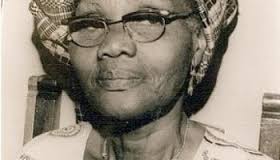When we mention heroines in Nigerian history, very little is said of the women. However, there are a lot of stories to tell about Historic Nigerian women. 

Funmilayo Ransome-Kuti is one of the few female legends in Nigeria. One who brought to limelight the importance of women.
Funmilayo Ransome-Kuti (1900–1978) was born in Abeokuta, in present-day Ogun State, Nigeria. She was one of the first women to attend Abeokuta Grammar School in 1914, where she would go on to teach.
In 1919 she left for Wincham Hall School for Girls, Cheshire, England, to pursue her studies. By the time of her return to Nigeria in 1922, no doubt in reaction to the racism she had encountered in Britain, she had dropped her Christian name, Frances Abigail.
She soon became associated with some of the most important anti-colonial educational movements in Nigeria and West Africa*, and fought tirelessly to further women’s access to education and political representation.
Her children Beko, Olikoye and Fela, would all go on to play important roles in education, healthcare, the arts and political activism.
In 1944, she founded the Abeokuta Ladies’ Club (later, the Abeokuta Women’s Union), committed to defending women’s political, social and economic rights, which became one of the most important women’s movements of the twentieth century. Her unwavering commitment to cooperation, solidarity and unity led her to play an active role in politics, notably in the pre-independence constitutional negotiations of 1946.
In the year 1949, she led a protest against the Alake of Egbaland, a native authority. She then made a presentation of documents alleging abuse of authority by the Alake, whom the then government, granted the right to collect the taxes. She also led a movement that oversaw the successful abolishing of separate tax rates for women. In the year 1953, she founded the Federation of Nigerian Women Societies, an association that subsequently formed an alliance with the Women’s International Democratic Federation. Funmilayo Ransome Kuti campaigned for, and ensured that women’s votes counted during elections.
Before the Nigeria’s independence of 1960, Funmilayo founded the Commoners Peoples Party in an attempt to challenge the ruling NCNC, this action ultimately denied the NCNC victory in her area.
In the year 1965, Funmilayo Ransome-Kuti received the national honor of membership in the Order of Nigeria, and was also bestowed the honorary doctorate of laws by the University of Ibadan in the year 1968. Throughout her career, Funmilayo was known as an educator and activist. She joined forces with Elizabeth Adekogbe in providing dynamic leadership for the women’s rights in the 1950s. She founded an organization for women in Abeokuta, that had more than 20,000 women as members, including both literate and illiterate women.



0 Comments